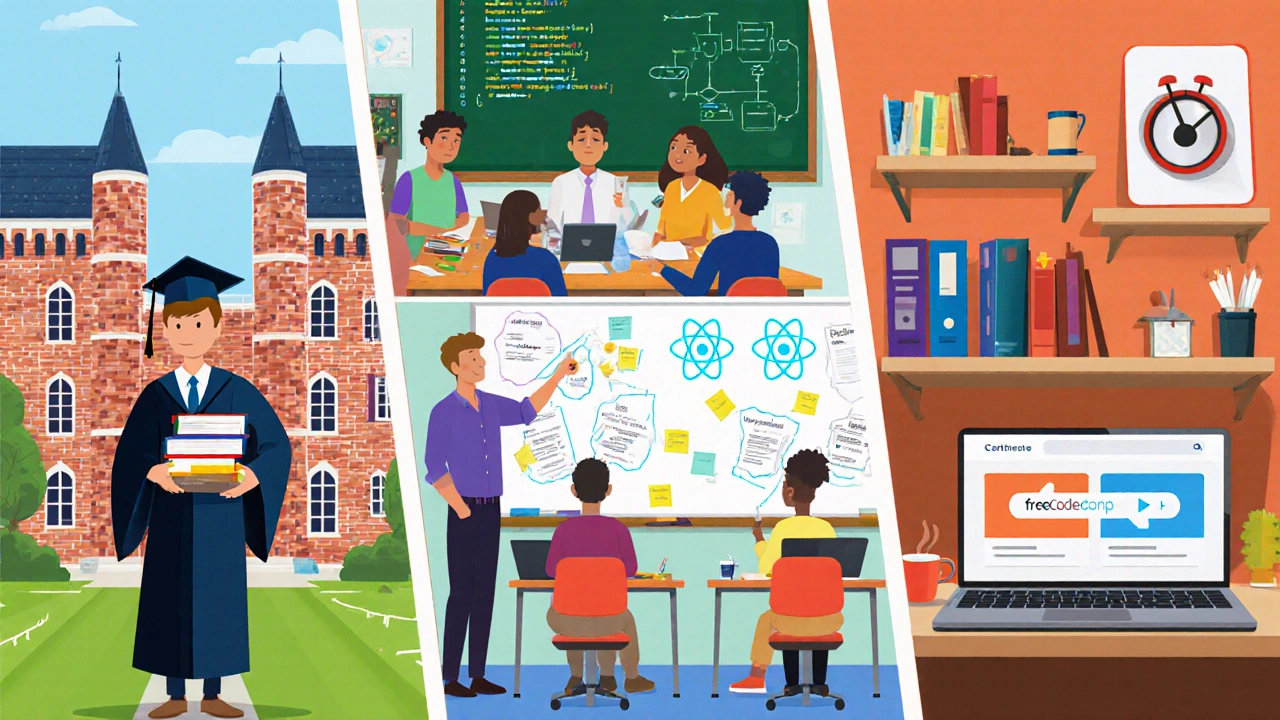Ever stared at a job posting that says “requires a Computer Science degree” and wondered if you’re doomed without a diploma? You’re not alone. The tech world is full of myths about credentials, and the truth is more nuanced than a simple yes or no.
What a Full‑Stack Developer is
A Full‑Stack Developer writes code for both the client‑side (what users see) and the server‑side (the logic that runs behind the scenes). This means you’ll juggle HTML/CSS, JavaScript frameworks like React, server runtimes such as Node.js, and databases (SQL or NoSQL). The role is versatile, and employers look for a blend of practical skills, problem‑solving ability, and a knack for learning new tools quickly.
What a Computer Science degree covers algorithms, data structures, theory of computation and core software engineering principles actually gives you
Traditional CS programs provide a solid theoretical foundation-think algorithm complexity (Big O), operating systems, compiler design, and formal methods. They also expose you to a variety of programming languages and research projects, which can sharpen analytical thinking. Many graduates graduate with a network of peers and professors, plus access to campus recruiting events.
Alternative pathways: bootcamps, self‑study, and online courses
In the past decade, coding bootcamps have exploded. A typical full‑stack bootcamp runs 12‑16 weeks, costs between $7,000‑$15,000, and promises job‑ready skills. Self‑study routes-using resources like freeCodeCamp, YouTube tutorials, and MOOCs-can be cheaper but demand discipline.
| Aspect | CS Degree | Bootcamp | Self‑Study |
|---|---|---|---|
| Cost (USD) | $30,000‑$120,000 | $7,000‑$15,000 | $0‑$500 (mostly free) |
| Duration | 3‑4 years | 3‑5 months | Variable |
| Theoretical depth | High | Medium | Low‑Medium |
| Hiring rate (survey 2024) | 68% | 55% | 48% |
| Credential value | Strong | Growing | Depends on portfolio |

Core skills that matter more than the piece of paper
Hiring managers repeatedly cite a handful of practical abilities. If you can demonstrate these, the lack of a CS degree becomes a minor footnote:
- Proficiency in JavaScript (ES6+), including async/await and module systems.
- Experience building a single‑page application with React or Vue.js.
- Ability to design RESTful APIs or GraphQL services using Node.js or Python (Flask/Django).
- Understanding of relational (PostgreSQL, MySQL) and NoSQL (MongoDB) databases.
- Familiarity with version control (Git) and CI/CD pipelines.
- Basic cloud knowledge-deploying to AWS, Azure, or Netlify.
Building a portfolio that replaces a diploma
A well‑crafted portfolio is the modern equivalent of a CV page. It should contain:
- Three to five complete projects hosted live (e.g., a blog platform, an e‑commerce demo, a real‑time chat app).
- Source code on GitHub with clear README files.
- Documentation of the tech stack, challenges faced, and how you solved them.
- Performance metrics or user feedback (load times, test coverage, number of users).
When interviewers see a functional app that solves a real problem, they often skip over the degree question entirely.

What hiring managers really look for during the interview process
Typical stages include:
- Phone screen: assess communication, cultural fit, and basic technical jargon.
- Technical screen: live coding on platforms like CoderPad, focusing on problem‑solving rather than language trivia.
- Take‑home assignment: usually a mini‑project that mirrors real work (e.g., building a CRUD API).
- System design interview: evaluate how you architect a full‑stack solution, discuss trade‑offs, and choose appropriate tools.
Notice how each step cares more about your thought process and ability to ship code than about a diploma.
Checklist to land your first full stack developer job
- Master the core JavaScript ecosystem (ES6+, Node.js, React or Vue).
- Complete at least three full‑stack projects and host them publicly.
- Write clear README files and include unit tests (Jest, Mocha).
- Get GitHub followers or star count > 50 (shows community interest).
- Earn a certification from a reputable platform (e.g., AWS Certified Developer) to add credibility.
- Network on LinkedIn, attend local meetups in Bangalore, and contribute to open‑source.
- Prepare for common interview questions: algorithm basics, async patterns, database normalization.
Bottom line: Is a CS degree a must?
Short answer: No, it’s not a strict requirement. Long answer: It can accelerate your learning curve and open doors at large enterprises that have strict HR filters. However, if you can prove your ability through projects, a solid portfolio, and real‑world problem solving, many companies-especially startups and mid‑size firms-will hire you without ever asking for a degree.
Do companies really ignore degree requirements?
Yes, especially in tech hubs like Bangalore and remote‑first startups. They prioritize demonstrable skill sets and project outcomes over formal education.
How long does it take to become job‑ready without a degree?
Intensive bootcamps promise readiness in 3‑5 months, but most self‑taught developers need 9‑12 months of consistent practice to build a strong portfolio.
What entry‑level salary can I expect?
In India, junior full‑stack roles range from ₹5 Lakhs to ₹12 Lakhs per year, depending on city, stack, and project experience.
Is a certification worth pursuing?
Certifications like AWS Developer or Google Cloud Associate can boost credibility, especially if you lack a degree, but they’re not a substitute for real code.
Can I switch to full‑stack later in my career?
Absolutely. Many professionals start as front‑end designers or backend engineers and gradually pick up the missing pieces through projects and continued learning.
